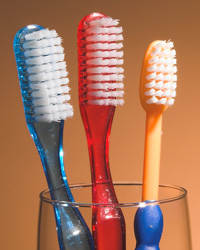Fighting Bad Breath with Good Dental Hygiene
Bad breath, or halitosis, is a signal that something is not right inside your mouth. It may be as simple as the need to pay more attention to your daily oral hygiene, or it may indicate tooth decay, gum disease, or another medical problem. Whichever it is, bad breath is a red flag: take another look at your mouth!
Bad breath is a social problem; if you have bad breath, you may notice that people actually back away as you talk to them. Mouth odors are embarrassing, and they tell other people that you aren't taking care of yourself.
Sometimes people are not aware that their breath smells bad; be alert to how other people react when they're close to you, and be grateful if a friend or family member lets you know about the problem.
Commercial products claim they will make your breath fresher, but the only way to make sure your breath permanently fresh is to practice good oral hygiene. In fact, eating too many breath mints and hard candies with sugar will lead to tooth decay. If you are constantly using breath mints, breath sprays, or mouth rinses in an effort to cover up your bad breath, you may have a dental or medical problem that needs addressing.
There are a number of reasons you may experience a bad taste in your mouth, and even be able to smell your own breath. Food may be lodged between your teeth if you are not brushing at least twice daily and flossing regularly.
Food particles can be very tiny and can wedge themselves between teeth and below the gum line; brushing after meals is important and flossing is imperative to get at the particles that the brush can't reach. Also, you must brush your tongue or use a tongue scraper.
As odd as it will feel at first, bacteria collects on the tongue and can contribute to bad breath. If you wear removable dentures, take them out at night and clean them thoroughly before you wear them again.
If you neglect your dental hygiene over time, bad breath can become a symptom of more serious dental problems. Teeth that are not cleaned properly become a place for bacteria to reside as food particles stay in your mouth and decay. Bacteria attack your teeth and gums and cause cavities and gum disease. If this is happening, gum disease will cause an unpleasant odor.
Perhaps you are brushing and flossing on a regular basis, but are still experiencing bad breath. If you have teeth that are crooked or crowded, it may be hard for you to clean between them, and this can cause bad breath.
If you wear dentures that are not fitted properly, they may be trapping food or irritating your mouth. Or perhaps your bad breath is caused by another medical problem: drainage from your sinuses, gastrointestinal problems, kidney or liver problems, or other medical conditions.
>Here's what you can do to investigate on your own. Write down what you're eating and notice whether your breath smells bad because of certain foods. Garlic and onions actually cause odor, but the odor is coming from your lungs as you breathe, not from your mouth itself. The odor from these foods is temporary, and will be gone once the food is out of your bloodstream.
Are you dieting? Hunger can contribute to bad breath, because of the chemical changes as your body turns fat and protein into the energy it needs. Are you taking prescription or over-the-counter medications? Add these to the record of what you're eating to see whether there's a relationship between your medications and your bad breath. And don't forget to tell your dentist if there's been a change in your overall health since your last visit.
Are you suffering from dry mouth? Saliva provides constant rinsing in your mouth and washes away food particles. Your dentist may recommend more liquids, and sugarless candy to stimulate natural saliva, and perhaps some of the commercial products that are available to combat dry mouth.
If bad breath continues after you have done your best job of regular brushing and flossing, start with your dentist or dental hygienist. He or she can tell you whether the odor is caused by an oral problem; if it is not, then your dentist will suggest you see your doctor for a physical check-up.
Regular dental check-ups will help keep your mouth healthy and working well. Your dentist can spot problems before they cause trouble, including problems that cause bad breath.
By Brian J. Gray, DDS, MAGD, FICO

+Jim Du Molin is a leading Internet search expert helping individuals and families connect with the right dentist in their area. Visit his author page.
Healthy Smooching: Good Oral Hygiene Leads to Great Kisses
Whether you're preparing for holiday mistletoe or are just in the mood for some love, you're probably fully aware of the connection between the state of your mouth and the quality of your kisses. Still, a little reminder never hurt. Here's the skinny on getting lucky without embarrassment (from your mouth, anyway)!
Kick the Smoking Habit
I'm sure you're very familiar with the smoking lecture. Not only do tobacco products taste awful to your partner, but they put you at greater risk for oral cancer and periodontal or gum disease. Why put so much effort into knocking your sweetheart's socks off if you aren't going to be around to pick them up? If you don't kick the habit for your partner, do it for yourself.
Don't Chew Gum
The best smooches are spur of the moment, so it's best to be prepared for them. Besides, sugary gum can lead to tooth decay, AKA cavities. If you must chew gum (maybe you want your breath to be in top shape), choose a sugar-free variety like Xylitol.
Brush and Floss
Nothing leaves an impression like bad breath, but it's not the kind of attention you want. Besides, healthy white teeth will help you build confidence in your smile. Brushing your teeth and gums is a good start, but take it a step further and floss each night. You'll dislodge food particles and remove odor-causing, not to mention tissue- and tooth-destroying, bacteria. If you don't have your toothbrush handy after you eat, at least rinse your mouth out with warm water. There are also a number of handy little dental hygiene products available for great breath on the go.
Take good care of your partner by caring for yourself. If you find that your gums are exceptionally tender or swollen, or if you have habitually bad breath, make an appointment with your dentist. These could be symptoms of a more serious problem!

+Jim Du Molin is a leading Internet search expert helping individuals and families connect with the right dentist in their area. Visit his author page.








